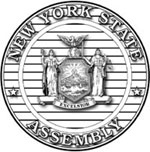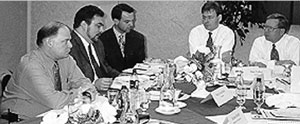
Update
from the
Committee on
Economic
Development
| New York State Assembly Albany, New York 12248 |

|
Legislative Update from the |
NYS Assembly Committee on Economic Development |
|
|
|
Sheldon Silver, Speaker |
 "Terrorism destroyed buildings, but it failed to shake our resolve and pursuit of liberty. We will answer the terrorists by making New York City and our state more dynamic than ever before." ROBIN SCHIMMINGER Room 847 LOB Albany, NY 12248 (518) 455-4767 3514 Delaware Avenue Kenmore, NY 14217 (716) 873-2540 |
Message from the Chair... Dear Friend, The horrific events that took place on September 11th affect us all. As the World Trade Center collapsed, it sent a shockwave across our state and country. But as we grieve our losses, we draw inspiration from the heroic police officers, fire fighters, and emergency workers who epitomize the strength, courage and perseverance of our nation. New Yorkers must now show their fierce resolve by proving we will not allow these attacks to change the way we live our lives. That is why we went right to work to begin addressing the fiscal challenges caused by these terrorist attacks — in particular, the challenges now facing our business community. The Assembly has designed a disaster relief package that would provide assistance to affected businesses through grants, low-cost loans and tax incentives. The Assembly was also successful in assisting businesses across the state by expanding its Empire Zones program to provide tax relief to more job-creating businesses. And in spite of shrinking state revenues, the Assembly will work hard to ensure that the business tax cuts we have enacted remain intact. Through a combined effort from the state and federal governments, New York will overcome these hardships to emerge stronger and more prosperous than before. Sincerely,
Robin Schimminger Chairman, Committee on Economic Development |
|
|
| Targeted steps to help spur the state’s economy |
|
Rebuilding
Lower Manhattan Manhattan plays a central role in the state’s — and the nation’s — economy. In fact, before the September 11th attack, jobs in Manhattan below 14th Street alone accounted for 14.9 percent of the state’s total wages. It is critical for the prosperity of the entire state that we work to retain and expand lower Manhattan’s status as the financial capital of the world. To stabilize and restore this vital area of New York, the Assembly introduced a disaster relief package that includes legislation to create a Lower Manhattan Resurgence Authority (A.9465), with broad powers to plan and finance efforts to rebuild the area devastated by the attack on the World Trade Center. The authority would be able to:
The legislative package builds on the newly created lower Manhattan Liberty and Resurgence Zones, which provide Ground Zero businesses with significant tax relief. The zones are modeled after the Assembly’s successful Empire Zones program, which creates virtually tax-free zones to create and retain jobs in struggling areas of the state. |
The Assembly passed legislation in October that will help bolster the state’s economy and create jobs, improve the state’s long-term financial outlook, and begin to address the fiscal challenges presented by the September 11th terrorist attacks. The plan includes a $100 million economic development package to stimulate the state’s economy, including:
The Assembly also expanded its successful Empire Zones program by increasing the number of new zones to be created in the current designation round from six to 14. Empire Zones are virtually tax-free areas designed to attract businesses and jobs to struggling areas of the state. In November, the state’s Empire Zone Designation Board, of which Assemblyman Schimminger is a member, voted to create a new zone in the Town and City of Tonawanda, and earlier this month voted to create a new second zone in Buffalo. The other new zones designated so far are Hornell/Corning, Cortland County, Sullivan County, Staten Island, Columbia County Monroe County, Saratoga County and Warren County, bringing the total number of Empire Zones in the state to 62. Other provisions of the economic package include:
Please contact the committee with any name/address changes, or if you received more than one copy of this report. Send changes to: Assemblyman Robin Schimminger, Chairman |
|
|
|
2001 Legislative highlights |
|
| IMPROVING CROSS-BORDER RELATIONS. Assemblyman Schimminger is pictured with then Canadian Consul General Mark Romoff and Members of the Ontario Provincial Parliament Brad Clark, Tim Hudak and Bart Maves (left to right) during a meeting in Canada earlier this year. A delegation of New York and Ontario legislators co-chaired by MPP Maves and the assemblyman convenes periodically to discuss issues of mutual concern, including improved state-provincial cooperation regarding trade and tourism development. |

|
|
|
|
Helping businesses
secure low-cost loans The award-winning Linked Deposit Program (LDP) has been made permanent. LDP leverages low-cost loans to businesses to improve their performance and competitiveness from participating banks that agree to accept a lower rate of return on state deposits. Additionally, as businesses in distressed areas are eligible for an even lower interest rate, the definition of distressed area has been conformed to the most recent census and property wealth data to ensure that the enhanced benefit reaches the companies which need it most (Chapter 14, Laws of 2001). Refunding tax overpayments
As of September 19, 2001, the Commissioner of Taxation and Finance is now required to notify taxpayers if they have overpaid taxes and give them 120 days to make a claim for a refund (Chapter 307, Laws of 2001). Guarding Internet privacy
A new law passed by the Assembly will require all state agencies to develop on-line Internet privacy disclosure policies. Information that is intended for transactions of a personal and confidential nature must be private and should be accessible by the intended receiver only. Eliminating privacy concerns will promote the use of the Internet. (Chapter 578, Laws of 2001). Working together to attract business
The Assembly passed a law that will allow two or more municipalities to work together to establish a business improvement district — helping communities work together more cooperatively and creatively to attract businesses (Chapter 328, Laws of 2001). Redeveloping local waterfronts
The Assembly enacted a new statute consolidating state programs that aid waterfront development efforts in coastal areas, while also including inland waterways, encouraging inter-municipal agreements and providing technical assistance to local governments (Chapter 454, Laws of 2001). |

|
STAYING IN TOUCH. Assemblyman Schimminger and host Tom McNulty pause for a break during a recent broadcast of the Saturday morning "McNulty Business Hour" on WWKB-AM 1520 radio. The Assemblyman fielded calls from listeners in Central and Western New York with questions on state economic development policies and business assistance programs. |
|
|
|
Assembly preserves scheduled 2001-02 tax cuts |
|
|
|
Elimination of Gross Receipts Tax
Manufacturers and industrial energy consumers have been saving money since January 2000 through the elimination of the Gross Receipts Tax (GRT). Commercial customers will continue to benefit from the phased elimination of the GRT on their energy bills, including the reduction that became effective on January 1, 2002. Elimination of energy sales tax
Sales taxes on the transportation, transmission or distribution of gas or electricity when purchased through non-utility retail access are being phased out over a four-year period, with the first 25% rate reduction taking effect on September 1, 2001.
The corporate franchise tax rate dropped to 7.5% from 8% in July 2001, and the tax equivalent on Subchapter S corporations was cut to .65% from .825%. Bank and insurance tax rates
The tax rates on banking and insurance corporations dropped to 8% for tax years beginning on or after July 1, 2001. |
|
|

|
BOOSTING HIGH-TECH. Assemblyman Schimminger joins Governor George Pataki and Dr. Russell Bessette, Executive Director of the N.Y.S. Office of Technology and Academic Research, in announcing the designation of the STAR Center of Disease Modeling and Therapy Discovery in Buffalo. The state’s STAR (Strategically Targeted Academic Research) Centers initiative will spur world-class research, technology and product development, and spin off businesses and jobs. In addition to Buffalo, STAR Centers focusing on distinct specialties have been approved for Albany, Ithaca, Long Island, New York City, Rochester, Syracuse and Troy. |
|
Back |